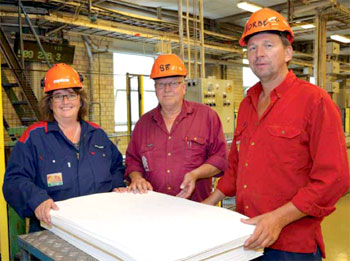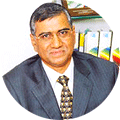Helming with heart
09 December, 2015 | Manufacturing Today
ShareMs. Christin Norberg, Production Manager, DomsjÖ Fabriker AB, banishes the notion that factories are an all-male bastion
Christin Norberg, Production Manager, DomsjÖ Fabriker AB, banishes the notion that factories are an all-male bastion
 When one thinks of manufacturing, the image that usually surfaces in one''s mind is that of a greasy factory, with massive machines and workers toiling away in tandem. Rarely does one picture a woman heading such a set-up. However, Christin Norberg is no ordinary woman. The effervescent production manager at the Aditya Birla Group-owned DomsjÖ Fabriker AB''s plant in Sweden is the leader on the shopfloor.
When one thinks of manufacturing, the image that usually surfaces in one''s mind is that of a greasy factory, with massive machines and workers toiling away in tandem. Rarely does one picture a woman heading such a set-up. However, Christin Norberg is no ordinary woman. The effervescent production manager at the Aditya Birla Group-owned DomsjÖ Fabriker AB''s plant in Sweden is the leader on the shopfloor.
Having joined DomsjÖ in 2009, Norberg has quickly risen to the top, and currently manages the day-to-day production activities at the plant. "I''m supposed to manage other managers. It is challenging and interesting," says Norberg. "Communication is important. For people to do their best, it is important for them to know why they should do something; the background and the context. And the big task for me is to give that overall view to my managers, so that they can go and feed it down to the whole organisation. Everyone then knows why they are doing things, including the direction and goals that they need to achieve."
Working with a team of 400 employees, she is focused on trying to increase production capacity at the mill from the current 220,000 tonnes to at least 255,000 tonnes per year. To make this possible, Norberg has to follow a rigorous daily schedule. Her day starts at 6 am when she reads an email report, detailing events at the mill from the previous 24 hours. "One of the most interesting things about this job is that one day is not the same as another day," she admits.
Having woken up to this, she is prepared for what to expect when she arrives at the mill, which is usually around 7-7.30am. An intense conversation with the shift in charge follows, and she is made aware of all that has transpired at the mill. "The shift in charge is there for 24 hours. There are six of them - so they keep switching places. They know what has happened, including the problems and issues to be dealt with. If it is something important or difficult, then I have to take care of that. I see if I have to send for help or order some spare parts or whatever. But most of the times, I can go on with a normal day, which is filled with a lot of meetings with the management team at the production unit," she explains.
 "We have world class systems and processes in place at DomsjÖ. Of course, this is at the core of all Aditya Birla Group factories across geographics, meritocracy matters in every aspect."
"We have world class systems and processes in place at DomsjÖ. Of course, this is at the core of all Aditya Birla Group factories across geographics, meritocracy matters in every aspect."— Mr. K. K. Maheshwari, Sector Head - Fibres &; Textiles, Aditya Birla Group
Norberg has been involved with many changes in processes at DomsjÖ. One of the big projects she has undertaken is the Improve Project, which aims to work with more planning and preventive maintenance and less with acute maintenance. She believes in planning, rather than fixing and has been steering group work around this new goal. Another big focus for the company is environmentally friendly processes. Several projects have been initiated as a way to preserve sea life in the River Mo, which flows near Ornskoldsvik, and as a result, salmon fish have returned to the river.
They try to recover as much as possible in the process in order to minimise the environmental load with the effluent on the recipient. No water from the bleaching is let out; instead it is recovered in the production process. They don''t use any chlorine containing bleaching chemicals. Instead, TCF bleaching, which is totally chlorine free, is utilised. The only bleaching chemical incorporated is hydrogen peroxide, which ends up as oxygen and water, when consumed. That is why DomsjÖ calls itself a bio-refinery. DomsjÖ calls itself a biorefinery since we make more from the tree, we don''t just produce cellulose but also lignosulphonate, bioethanol and biogas for example.
"The company produces cellulose for the viscose business; from the lignin, we make lignosulfonate for the concrete business. We also make ethanol. The gas produced from burning is re-used in the process as energy. So we use biogas in our lignin dryers, when we produce lignin. That way we can recover as much raw material as possible to make other products," explains Norberg.
Even though following environmental norms has always been important to them, most of DomsjÖ''s processes, at the larger level, came after Aditya Birla Group took over in 2010. Norberg says it is nice to be under the Aditya Birla Group, because earlier they were one lone mill, whereas now they work alongside several companies. Also, about 70% of DomsjÖ''s production gets integrated in the group itself, providing a welcome safety net.
 "We have converted a 110-year-old pulp mill into a high-tech bio-refinery. The innovation is attributed to the DomsjÖ team, supported by the Aditya Birla Group."
"We have converted a 110-year-old pulp mill into a high-tech bio-refinery. The innovation is attributed to the DomsjÖ team, supported by the Aditya Birla Group."— Mr. Vinod Tiwari, COO, Pulp Operations, Aditya Birla Group
The clarity of her vision is reflected across her unit, and is possibly what has helped them sail through some tough times. For instance, there was a period when the bio-treatment facility at the mill was not functioning well, affecting overall performance. With production low, there was a lot of pressure on the team to get back on track. Although Norberg felt it too, she believed in the organisation and put in her best. With some help from consultants and, of course, numerous discussions with colleagues at the Aditya Birla Group, the DomsjÖ team emerged with flying colours. A lot of that credit goes to the fabulous team that Norberg has in place.
There are high demands on people when they join DomsjÖ. Engineers and now, even operators, must come with university degrees. Some kind of technical experience from another mill is very valuable. But above all, Norberg believes that it is certain qualities that set the best workers apart. "When they come here, it is important to be humble and listen to the people who have been here for so many years. Learn from their experience, and also join the courses that we are giving. Do it in a passionate way and take in whatever is offered," she says sagely.
An avid chemistry buff, Norberg is lucky to have made her passion her profession. Leading from the front, after six years at DomsjÖ, Norberg has managed to c;reate a niche for herself. Although she dismisses the fact that she is a woman in a man''s world, by saying that Sweden is ''a very equal society'', she believes that, "A mix of men and women in the workplace gives the best results. I think problem solving is done in different ways. So if there is a mix of men and women, (the sum of that mix) is more than two." We couldn''t agree more! With manufacturing gaining momentum in India, one can only hope that this trend of a more inclusive workplace will soon be reflected across major production domains in our country too.






